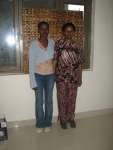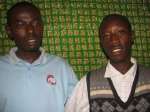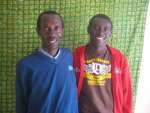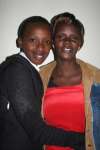Musabyimouna Edith & Lemurunyai Sandrine
Musabyimouna Edith tells her daughter how she went from being a lazy, spoiled daughter, to a hardworking survivor and mother. She describes how she was able to survive the genocide partially through her own willingness to change, but largely through the benevolence of strangers who were willing to hide, clothe and feed her during the violence. In order to survive, Musabyimouna Edith relied on strangers to conceal her identity and endured several close encounters with potentially violent individuals.
Mukantwali Félicita & Rutiganda Rigobert
Mukantwali Felicita and her son discuss their family’s history; Felicita’s life as a refugee and orphan, and how lucky Rutiganda Rigobert is to have an emerging and improving Rwanda in his future. Together they discuss how Rutiganda Rigobert can become a part of a new generation that prizes education, learns from the Rwanda’s past, and moves Rwanda forward in education, culture and health. Their conversation touches on a variety of subjects ranging from the causes of the genocide to relationship advice.
Niyiguba Emmanuel & Rugira Jean Rene
Older brother Niyiguba Emmanuel explains in great detail the genocide that resulted in the brothers' loss of several siblings and one parent. Rugira Jean Rene recounts to his brother the details of the genocide and ethnic discrimination that he is familiar with and Niyiguba Emmanuel elaborates on these facts with more details and additional information, helping his younger brother to understand his country's and family's history better.
Muhizi Jean Claude & Masengesho Jean de Dieu
Muhizi Jean Claude wants to inspire his friend Masengesho Jean de Dieu to be hopeful about the future by reflecting on how much has changed since his youth. Muhizi Jean Claude talks about how the segregation that existed in schools and how political instability contributed to the genocide. In answer to Masengesho Jean de Dieu’s question about ways for people to heal their emotional pain, Muhizi Jean Claude emphasizes youth breaking the cycle of ethnic discrimination.
Mukamana Theopista & Umuvandimwe Marie Claire
Umuvandimwe Marie Claire looks up to Mukamana Theopista, and wants to hear about her friend's past in order to learn from her. When asked about what “was your happiest moment and what was your saddest moment,” Mukamana Theopista discusses growing up in poverty and moving through many tragedies into a positive present. She thanks God and her loving husband for supporting her through house fires, illness, and lost children. She encourages Umuvandimwe Marie Claire to be thankful for what she has and to have faith that she will have a good partner and strong marriage.
Mukakayonde Anna & Nyiranzeyimana Solange
Nyiranzeyimana Solange comes to storytelling discontented about her life, wondering why she was left alone. Because she is young, she only knows the life she has right now, and cannot compare it to any other life, like the one during the genocide, and before. Could there have been a better life than this one, she asks her elder? Mukakayonde Anna works very hard to convince Nyiranzeyimana Solange that right now life is much better than before. In the same breath that she tells Nyiranzeyimana Solange that her relatives died in the genocide, she tries to bring hope.
Bankundiye Albertine & Nyinawumuntu Violette
With a focus on the importance of kindness and acceptance, Bankundiye Albertine tells her friend Nyinawumuntu Violette about her family’s past. She talks about her father, an educated man who was killed in the genocide, who would take children off the streets and help them get into schools. His good deeds and reputation inform Bankundiye Albertine’s actions and continue to keep her safe. She also mentions her challenges with her mother’s side of the family. Nyinawumuntu Violette offers consolation and advises Bankundiye Albertine to be loving towards her family and they will love her back.
Bisangwa Simon & Kubwimana Jean d'Amour
Kubwimana Jean d’Amour would rather listen to history from his father than read it in a history book “written by Frenchmen.” In this interview, he listens to Bisangwa Simon’s personal history for the first time, an experience that both men find beneficial. Bisangwa Simon has had a chaotic life; a high school dropout, he lived through several wars, overcame addiction to alcohol and drugs, and survived a curse. He tells his son how their family survived the genocide by supporting each other in hiding.
Nyirambarushimana Devote & Uwimana Grace
Nyirambarushimana Devote takes this opportunity to give her daughter, Uwimana Grace advice, for she wants Grace to live a better life than she did. She says that the most important thing is to work hard and to always cooperate with others. Nyirambarushimana Devote emphasizes that if you work well with others you can achieve much more than if you work only by yourself. Uwimana Grace is thankful for this advice, and she offers to help her mother to support the family.



_0.thumbnail.JPG)









